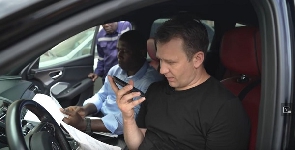In a stunning turn of events, a car stolen from a Toronto driveway in Canada has been discovered parked in Ghana, approximately 8,500 kilometers from its original location.
This discovery was made by David Common, a journalist from CBC News who has been investigating stolen vehicles in Canada.
The car's original owner, Len Green, received an unexpected call from the CBC journalist after his phone number was found inside the vehicle.
Green had lost his vehicle in 2022 and had no knowledge of its whereabouts until this surprising call from Ghana.
During the phone call, Common informed Green, "I'm calling from CBC News. We're conducting an investigation into stolen vehicles, and I'm pretty sure I'm sitting in your vehicle in West Africa."
Green was understandably shocked to learn that his stolen car had ended up so far from its original location, exclaiming, "I can't believe it... that's crazy."
The revelation was captured in an investigative piece by the journalist into car theft in Canada.
In the same parking lot, the journalist found dozens of other vehicles, some with Canadian license plates, often with their provincial registration and insurance documents still in the glove box. All of which vehicles had been reported stolen from Ontario and Quebec.
In 2021, there were just over 27,000 reported cases of vehicles stolen from Ontario alone, according to a recent report by the Canadian Financing and Leasing Association. This equates to a car being stolen every 17 minutes.
Similarly, an investigation by Mariana van Zeller for the National Geographic Channel, published in April this year, exposed a sophisticated car smuggling syndicate traced to Ghana.
The investigation started in the United States of America, where the investigative journalist followed the activities of a gang involved in stealing of luxury cars.
Some of the gang members who spoke to Van Zeller explained how they carry out their activities and the structure of the international crime syndicate that sees stolen cars from the streets of America end up in third world countries like Ghana.
Van Zeller traveled to Ghana to meet some of the local players.
She met a hacker/black market trader and another person who handles the business aspect of the enterprise.
The two provided the journalist with insights into the local trade of stolen cars and how they are able to get the cars into the Ghanaian system without raising any red flags.
With import duties costing as much as 20% of the value of a car in Ghana, the hacker told Van Zeller that he can hack into the system of the Customs Division of the Ghana Revenue Authority to help the syndicate evade paying the required import duties.
"It is my duty to attack the Tema Harbour... We make it seem as if you've paid everything," the hacker stated.
As the final destination, the Ghanaian syndicate is considered to be at the top of the international car smuggling syndicate.
Identifying himself as Ivan, a man who leads the importation and sale of stolen cars in Ghana, opened up about the gang's operations to the journalist.
"It is possible that most of these cars are stolen. Most of the boys come here to hang out. There are top guys that are in the business now; the stolen cars business.
"This is how some family generations have made money," Ivan told the journalist as they drove through areas in Accra where the nightlife is buzzing.
Overall, the investigation revealed that the Ghanaian players are at the pinnacle of the international car theft ring. They make the most money from a criminal enterprise that sees cars belonging to people in America stolen and shipped over six thousand miles away from their owners.
EOCO retrieves stolen cars from garages in Accra
Police in the Canadian city of Mississauga on June 9, 2023, executed a search warrant which led to the recovery of eight stolen vehicles intended to be shipped to Ghana.
The vehicles, estimated to be worth approximately $650,000 in total, were in the process of being shipped to Ghana.
The eight cars consist of a 2020 Mercedes GLEC, a 2021 Mercedes GBG TY, a 2021 Honda CRV, a 2020 Honda CRV, a 2021 Honda CRV, a 2020 Honda CRV, a 2020 Honda CRV, and a 2021 Honda CRV.
Watch the CBC investigation below:
GA/SARA
Ghana’s leading digital news platform, GhanaWeb, in conjunction with the Korle-Bu Teaching Hospital, is embarking on an aggressive campaign which is geared towards ensuring that parliament passes comprehensive legislation to guide organ harvesting, organ donation, and organ transplantation in the country.
Watch the latest edition of BizTech and BizHeadlines below:
Click here to start the nomination process for the 2023 GhanaWeb Excellence Awards
Business News of Friday, 8 September 2023
Source: www.ghanaweb.com













